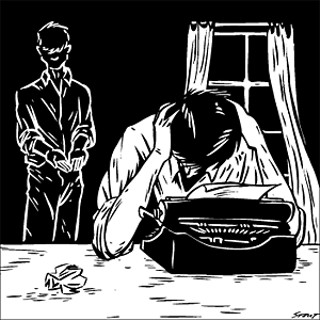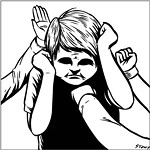Letters at 3AM
Ten Feet Away From My Soul
By Michael Ventura, Fri., Dec. 26, 2003

Los Angeles, 1985. With no warning and no mercy, suppressed childhood memories swamped me. The specific memories needn't concern us here but for their scope and effect: I was 40 -- but suddenly I was no age at all. All at once my experience and achievement lost their authority, the quality of my years was stripped from me, and any sense of identity. We live with others through the medium of our identity; without it, I was suddenly beyond the reach of loved ones whom I felt were relating to a "me" that no longer existed. Even writing seemed an empty exercise; I continued to write because it is my livelihood, but the voice of my writing now seemed the voice of a stranger. The nausea I felt at this can't be conveyed. To feel divorced from the voice of my writing was to lose all sense of purpose. I might live without identity (we fake so much of what we call "identity" anyhow), but I could not live without writing.
But it was strange how, in spite of the loss of self and purpose, something was there -- something for which I had no coordinates. I was discovering that even when we feel most alone and confused we are accompanied by something that cries out in our aloneness, cries out to our aloneness -- something different from, and deeper than, our usual sense of self. I believe now that this inarticulate feeling is a cry of the soul, taunting us, haunting us, with the proposition that the life we are living is not truly ours and the "I" we have assumed is not our true (or only) "I."
Reluctantly, full of confusion and shame, feeling utterly defeated, I sought therapy. And, like many defeated people, I resented and distrusted anyone who thought (so I imagined, resentment being no more than self-pity) that he was so far above me as to have the ability to save me.
He was a man in his 70s who'd been a psychotherapist for 40 years. I resented his surety -- it made my panic seem all the more shameful. I talked; he listened; nothing changed. I spoke about the memories and how they had stripped me; I related them to my writing. Talked a great deal about my writing. What I was really trying to do was to put the old man in his place: I was a writer, an artist, a very special animal, and so beyond the reach of his humble skills. I asserted an identity I no longer really felt, so every word made me emptier -- and I did not realize that I was making all this noise in order not to hear something quieter and deeper: the cry of my soul.
During our third session, just when I was silently deciding that this meeting would be our last, the old man quietly asked: "Have you any idea who you are 10 feet away from a typewriter?"
He was calm, absolutely present, speaking from his depths. His quiet question pierced my defenses. By the act of speaking from his depths, he was requiring an answer from mine. Feeling utterly exposed, I answered: "No. I have no idea who I am 10 feet away from a typewriter."
So the problem wasn't the memories themselves, though they were bad enough; the problem was that I was not yet developed enough, complete enough, to have anything to meet them with. The most revealing fact about these memories wasn't their content but my inability to respond to them. This, the old man would later say, is what the memories had returned to teach me.
I've said that in an experience of Soul we feel the Self as part of All. But such experiences are rare. Even people with a sense of soul tend to concentrate that awareness in some closed-off area of their lives. For we have come to accept as normal a drastically compartmentalized way of life in which work, family, friends, solitary privacy, and intimate (shared) privacy are often lived separately -- a way of life in which one of these modes often shuts out the others, so that we live in bits and pieces, as though in a house of rooms furnished in distinctly different styles. A common strategy, adopted unconsciously, is to concentrate our sense of soul in one or two parts of our life, while leaving other parts to lesser, more practical and manageable aspects of ourselves.
I had invested my soul in my writing -- and, by that time, only in my writing. So I had lost it there. Or to be more precise: I'd isolated it there. Abandoned it there. I had invested my soul in my writing but not in my life. My life was falling apart not because of the sudden re-emergence of a severe childhood trauma, but because that emergency needed to be met with my whole soul -- and my soul was invested in, caged in, my work. My emergency had forced me out of my work for the first time in a long time; it demanded that I face my life, my whole life, past and present. Being forced now to occupy my life, I felt divorced from my writing, that is, from the place where I'd isolated my soul. In my writing, my soul's voice was still strong, but it seemed the voice of a stranger; while in my life my soul's voice was weak, soft -- a suggestive, insistent whisper that I could barely hear -- or a cry in the distance from something I could not reach or rescue.
The process by which I'd invested my soulfulness in my writing -- and abandoned it there -- is not so different from how a mother may invest (and abandon) her soul in her children ... as athletes and dancers may invest (and abandon) their souls in their prowess ... as musicians may in their music ... as many do in their work. We gather our highest powers -- intellect, sensitivity, will, creativity, endurance, and our capacities for sacrifice, for devotion, for transformation, for living beyond ourselves (which is to say, our capacity for connecting to the All); then we take that which we have gathered and invest it in the object of our desire -- a project, a vocation, a theology, a family. Then if we are not careful (and how many of us are careful?) the best parts of us go, literally, into what we are doing and out of us. They are not ours anymore, we do not embody them anymore. We draw from them, we invest them, we channel them -- but we are so preoccupied with the passage of our energies into our works, that we become first a passageway and then a mere hole. We are still doing, perhaps mightily and well; yet we feel empty. And that emptiness spreads like a stain. We do not "feel ourselves," as the telling phrase goes -- we do not feel ourselves. We have less and less to share with anyone or anything that is not the specific object of these higher energies we've gathered and channeled. We feel less and less accompanied by some essential inner quality that once we had taken for granted, an inner quality that was our touchstone and by which we had known what it is to feel ourselves and to share that feeling with others.
But the absence of something can often behave like a presence: The emptiness calls to us constantly, reminding and complaining of what we have lost. This is the presence of a soul crying out, again a telling phrase: crying to be released into our daily hours and set free. We cannot feel complete until this is achieved.
"Do you have any idea who you are 10 feet away from a typewriter?" "No." Over the next year we fleshed out that question and answer. We drew a kind of map. I was located on a boundary. On one side of the boundary was the writing in which I'd invested and isolated what was best in me -- and my soul; on the other side was a life that I'd lost the ability to live. The old man and I watched that life fall apart piece by piece (my marriage, my job), and we discussed each piece as it tottered and shattered. And, though I tried, it was beyond my powers at the time to hold it together. But I was at least learning who I was 10 feet away from a typewriter.
I didn't know that the last time I left the old man's office would be the last time. I canceled appointments. Canceled some more. And then he died.
I counted the old man's therapy a success -- though in terms of my life the therapy had solved nothing. We are a solution-oriented culture; we see lack of solution as failure. But I was more than grateful to learn what my dilemma truly was. As my life fell apart, I saw it not only as a failure (though it was certainly that), but as a stripping-down to the essentials. Whatever life I would build now would be genuinely mine. I had learned in truth what before I had only assumed: that I was on a journey accompanied by an entity, an experience, that we call the soul -- though it was 10 feet away. Out of reach. But not out of hearing.
The old man had taught me to listen. To my soul. To strain to listen to it amidst the noise, the cacophony, of my disorderly life. Only time would tell whether such a lesson would result in what might be called "a therapeutic success." Only time would tell if I could traverse a distance of, it seemed, only 10 feet. I had traveled many distances, but none seemed so far as that. ![]()
This is the second of a three-part series, an expanded version of an article published in September's Psychotherapy Networker.









